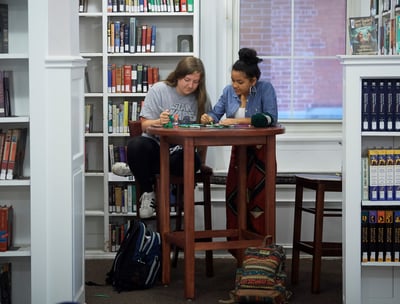 For some students, simply hearing the words “finals” and “week” used in the same sentence is enough to conjure up thoughts of stress, anxiety, and caffeine fueled all-nighters sponsored by Monster Energy drinks. However, in a year that’s been as tumultuous and fraught with never-ending cascades of challenges as 2020-21 has, making it through finals week unscathed can feel like an especially daunting task. With the right set of strategies, students will not only face their finals with confidence but also will create a foundation of effective work and study habits that will benefit them in college and beyond.
For some students, simply hearing the words “finals” and “week” used in the same sentence is enough to conjure up thoughts of stress, anxiety, and caffeine fueled all-nighters sponsored by Monster Energy drinks. However, in a year that’s been as tumultuous and fraught with never-ending cascades of challenges as 2020-21 has, making it through finals week unscathed can feel like an especially daunting task. With the right set of strategies, students will not only face their finals with confidence but also will create a foundation of effective work and study habits that will benefit them in college and beyond.
Regardless of whether it is a freshman preparing to take their first high school final, or a senior who is getting ready for their last one, creating a study schedule should be the number one priority when it comes to preparing for exams. Building an effective study schedule helps to identify knowledge gaps, reduce procrastination, and limit the stress and anxiety that comes with trying to cram everything in at the last minute. Because each student has their own learning style, the best way to build an effective study schedule is to create one that fits one’s individual needs. Check out the following tips for creating a customized A+ Study Schedule from Westtown’s Learning Center:
- Prioritize the weakest subjects first.
- Have a clear understanding of what will and will not be covered on the exams.
- Choose a visual format to organize tasks, deadlines, and materials needed.
- Make the schedule, then stick to it.
With a solid study schedule in place, the next step to prepare for finals week is to create to-do lists that outline concrete action steps as opposed to jotting down large, relatively vague tasks. Creating action plans allows students to break down large tasks into smaller items. This has the dual benefit of making them feel like they’ve achieved something while also establishing some much needed positive momentum. Looking at projects or assignments as a series of steps can be an effective tool for helping to quantify workloads. However, in the event that sustaining consistent effort becomes a challenge, limiting work and study time on a single task is another practical option.
In addition to creating a study schedule, there are also a number of other things students can do on their own to prepare for their major assessments. Believe it or not, one of the best ways to boost performance on your final exams is to do more testing! By using the Study-Test-Study-Test strategy, students can improve their metacognitive awareness, which will ultimately help to reduce the amount of time spent studying as they concentrate their efforts on addressing specific knowledge gaps. There are an unlimited number of practice tests available online for free, or possibly even posted in your student’s Canvas course or online textbook. However, if you’re not sure where to start looking, cK-12 offers a wide range of practice tests across a variety of subject areas.
Finally, even with a solid study plan in place and a long list of well developed strategies at their disposal, one of the most important things students can do when they’re preparing for finals is learn how to stop and take a break. While the intrinsic pressure to keep studying without coming up for air can certainly be a strong force at times, the truth of the matter is that transferring things from our short term memory to our long term memory is contingent on us taking strategic breaks to allow the content and material to stick. Rest is an essential part of recovery for our brains and our bodies, and there is such a thing as being too tired to study.
Students who take the time now to create their own strategies will not only be prepared for final exams this year but also will create the foundation for success in the future. To end the year strong, make a plan, take a deep breath, and don't forget to rest!


